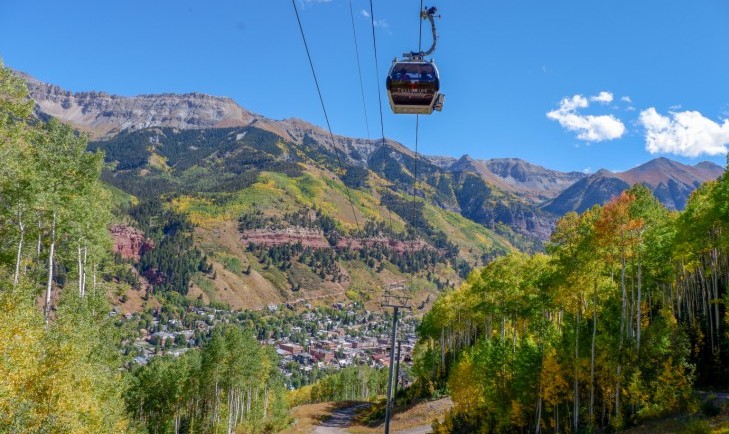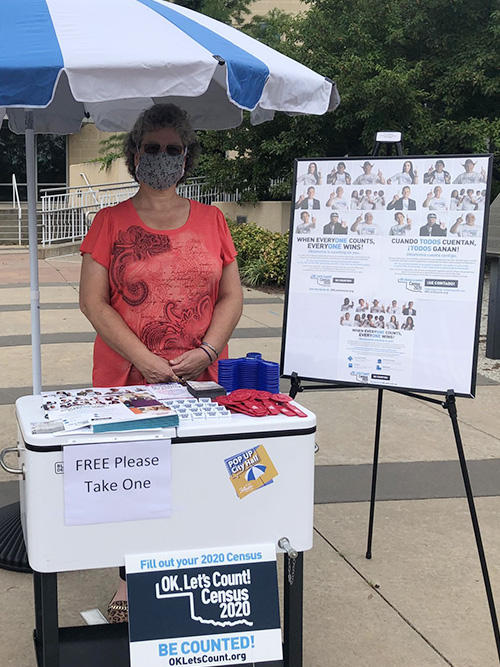
The Western Governors' Association keeps you updated on the latest news in the West. Here are the top stories for the week starting July 27, 2020. Photo: Telluride, Colorado. Courtesy of The Colorado Sun.
In many parts of the West, urban residents are leaving cities behind in favor of remote, rural communities.
In Colorado, housing inventories in mountain towns such as Steamboat Springs, Vail, Crested Butte, Telluride and Aspen are dwindling as a “great urban exodus,” driven in part by COVID, has motivated buyers to rethink city living.
“Everything is going wild right now. People are wanting to get out of the density of the urban environment, and they are wanting physical space and safety,” Aspen real estate broker Tim Estin told The Colorado Sun. “There’s high uncertainty and insecurity and there is something of a sentiment like, ‘If the whole world crashes and this COVID gets worse and worse, I’d rather be in Aspen than New York City or Miami or Dallas or Houston.’”
Other western states are seeing their demand for rural real estate soar as well. In Montana, a surge of wealthy, out-of-state homebuyers is fueling a drastic increase in Missoula home prices, according to the Missoulian. Northern Idaho is experiencing a similar trend, as is Jackson Hole, Wyoming.
“I’ve been doing this for 28 years, and I’ve never seen it like this,” said Idaho realtor Chad Oakland. “There is so much competition for so little inventory. Pricing is crazy. You will see 10 offers hours after a listing goes up.”
The influx is not without its challenges. As residents flock to nearby outdoor attractions such as Glacier National Park, officials are struggling to maintain a balance between preservation and recreation, the Flathead Beacon reports. Grand Teton and Yellowstone national parks are experiencing similar issues, especially with COVID-mandated social distancing reducing the number of guests these destinations can safely accommodate.
"It's strange time,” Oregon Parks and Recreation Department spokesman Chris Havel told the Statesman Journal. “Normally, with this level of use, we'd expand capacity at campgrounds and trailheads. But we can't do that right now."
Rural Hospitals: Many rural hospitals are struggling to stay afloat as COVID-19 spreads across the West. From stocking up on masks and other personal protective equipment to canceling elective procedures, the pandemic is delivering a massive financial blow to healthcare providers, many of whom are already operating on razor thin margins, Pew Trusts reports. “All hospitals suffered when they responded immediately to the request to try to flatten the curve of the pandemic by essentially shutting down every way you make money,” said Peggy Wheeler, vice president of rural health and governance at the California Hospital Association. Even with federal aid from the CARES Act, many experts warn that the current rural healthcare model is unsustainable long-term. Read more.
Surveillance Testing: In an effort to address a backlog of COVID-19 tests, Montana State University (MSU) will start processing samples, giving the state the ability to screen an additional 500 asymptomatic individuals a day. “As the state's land grant university, this kind of service and outreach to the people of Montana is exactly what we’re called to do,” MSU President Waded Cruzado told Montana Public Radio. Additionally, Gov. Steve Bullock announced that Montana has finalized a contract with MAKO Medical, a North-Carolina-based laboratory, to run an additional 1,000 tests a day. Learn more about how the state is expanding its surveillance testing.
City of the Future: Officials in San Diego, California are using the pandemic as an opportunity to create the “city of the future,” Governing Magazine reports, by embracing changes such as remote work. Kris Michell, the city's Chief Operating Officer, estimates that more than 2,200 of the city's 11,000 employees are now working from home. "We've seen productivity go up and I don't expect that to change," she said. "When employees are happier, they work more." To help facilitate the permanence of remote work, the city has allocated a portion of its federal relief money to purchase thousands of new tablets and laptops, allowing many departments to shift from paper records to cloud technology. Here’s how else San Diego is working to modernize itself in the pandemic’s wake.
 Census Response: Due to COVID-19, the U.S. Census Bureau paused a large portion of its in-person counting efforts earlier this spring, making it difficult for rural communities to achieve an accurate count. According to KOSU, rural and small towns in Oklahoma had a response rate of 53% as of May, compared to 66% in suburbs. Since federal funding is informed by census data, undercounting could cost the Sooner State millions of dollars, much of which would be used to fund projects in rural areas. More specifically, Josh McGoldrick, the chief of staff for the Oklahoma Department of Commerce, estimates the state loses $1,675 each year for every person who does not fill out the census. Find out how officials are working to limit undercounting.
Census Response: Due to COVID-19, the U.S. Census Bureau paused a large portion of its in-person counting efforts earlier this spring, making it difficult for rural communities to achieve an accurate count. According to KOSU, rural and small towns in Oklahoma had a response rate of 53% as of May, compared to 66% in suburbs. Since federal funding is informed by census data, undercounting could cost the Sooner State millions of dollars, much of which would be used to fund projects in rural areas. More specifically, Josh McGoldrick, the chief of staff for the Oklahoma Department of Commerce, estimates the state loses $1,675 each year for every person who does not fill out the census. Find out how officials are working to limit undercounting.
READ: COVID-19 in the West: A state-by-state breakdown of the Governors’ work
Get the latest news about the West and its governors by following the Western Governors' Association on Twitter, Facebook and LinkedIn.
Check out our podcast, Out West, on Podbean, Spotify and Apple Podcasts